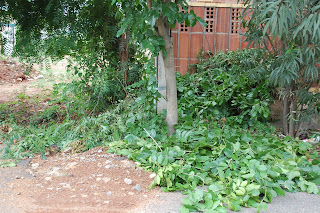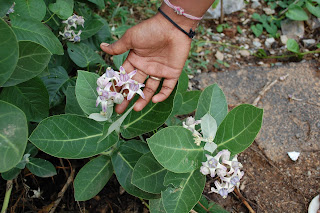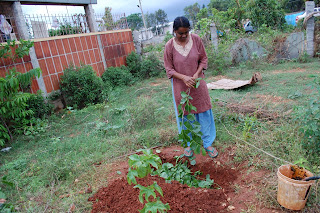For a long time, I had been looking for a good reason to cycle to Nandi hills. Last week, I decided to ride to Usha's farm Samaagama, at Chikkaballapura (near Nandi) where I have been spending most of my weekends, learning to set up a farm.
I did some homework before the ride as family members were worried that I was riding alone. I consulted my inspiration and mentor, Manjula, who has done many rides to Nandi and got to know that it was a pretty comfortable ride. Manjula suggested the option of taking a ride on the Airport bus, in case I needed a break from cycling or if the cycle broke down. She also shared the contact of a reliable cab driver, just in case. In the evening, the cycle was cleaned, and front and rear lights were checked. The cycle was ready for a long ride and so was I, with helmet, gloves and glasses.
Friday morning - started at 6:15 am. Cycled 15km, uphill all the way, to Majestic and reached at 7:30 am. Got into an airport bus and lied to the conductor that I am headed to the airport. I watched with guilt as he rearranged all the luggage to make space for my cycle. There was no trace of guilt as I paid Rs. 340 for the ticket - Rs. 104 for the cycle and Rs. 236 for myself - the most expensive trip to Chikkaballapura so far. An elderly Rotarian next to me started a conversation by inquiring about boarding changes at the airport. I told him about my cycling trip and he looked at my finger-nails and advised me to get my haemoglobin checked. So, here was some free medical consultation! Two minutes later, we were sharing stories about each others' travels and adventures. He encouraged me to start a Rotary circle in my area so that I could travel more and get sponsored for it. However, I am not very clear about the Rotaty concept, so politely listened to all his advice. It was soon time to get down. I went to the conductor and confessed that I had lied to him about going to the airport. The gentleman that he was, he just smiled and let me get off at Sadahalli Gate signal. If
not for the lie, I wouldn't have been able to take the bus.
8:30 am. Had covered 28km by bus. Messaged about my bus ride to my friends and they were confused as to how I managed to take a cycle on the bus. Restarted the ride and took a break for breakfast at 8:45. Sri Krishna Grand offered a table with a view of landing aircraft. Ate pongal and wada for Rs. 100!
9:15 am. Started to cycle again. The next stretch of about 27 km was uneventful except for a stopover for watermelon towards the end of the ride. The watermelon sellers were pretty impressed by the cycle.
11:15 am. Reached Srirampura, exhausted mainly because of the sun and wind.
During the entire journey, never did I feel that I rode alone, what with regular updates on calls, sms and Whatzapp with friends, family and well-wishers!
There was no time to rest as Usha and two others were waiting for lunch to be delivered in the forest where they had been cutting grass since morning. By 1:15 pm, I had made multiple trips from the village to the forest to deliver food and water. Finally, it was time for some well deserved rest.
Sunday morning. Started at 5:35 am. Rode before sunrise through a couple of quiet villages. An easy ride till Nandi Upachar - 19km in 1.5 hours. Had sweet elneer (tender coconut) and restarted in 10 min. A few minutes into the ride and I felt free and very happy with myself - not sure if it was endorphins or because I was finally able to make this ride happen.
Stopped for 10 min after 11km (near Sadahalli Gate) to check and clean chain. Saw some cyclists near Decathlon. Stopped again after 6km, this time for an indulgent masala dosa breakfast. The next stretch of about 12km was a breeze on the really good airport highway. Pity, there were no trees :(. The last kilometer to my friend's place near Hebbal was surprisingly difficult. As I reached my friend's place, I was treated to some delicious buttermilk by my friend's daughter. For a change, I was on the receiving end of some pampering. A refreshing bath and a good sleep followed. After spending some quality time with my friend's family, I started towards home at 4:00 pm and reached at 6:00 pm. The ride through the road between the golf course and the chief minister's residence was the best part as I cycled under the cool shade of tree canopies. The rest of the ride was mostly amidst Sunday evening traffic.
My 7 year old Trek 7.1 served me well throughout the journey and the puncture kit that I had packed so diligently didn't have to be used.
Ride summary
24th Feb, Friday
15km - 6:15 to 7:30 am - Majestic
28km - 7:45 to 8:30 - by bus, to Sadahalli Gate
3.5km - 8:30 to 8:45 - Breakfast stop at Sri Krishna Grand
27km - 9:15 to 11:15 - Reached Srirampura (Chikkaballapura), with a short break for watermelon
46 km by cycle, 28km by bus - Total 74km in 5 hours with breaks for breakfast and watermelon.
26th Feb, Sunday
19km - 5:35 am to 7:05 am - Nandi Upachar. Break for elneer
11km - 7:15 to 8:10 - near Sadahalli Gate
6km - 8:20 to 8:45 - A2B for breakfast, 7km before Yelahanka
13km - 9:10 to 10:00 - Friend's place near Hebbal
Total 49km in the morning, 4.5 hours with 2 breaks
24km in the evening, from 4:00 pm to 6:00 pm, no breaks
I did some homework before the ride as family members were worried that I was riding alone. I consulted my inspiration and mentor, Manjula, who has done many rides to Nandi and got to know that it was a pretty comfortable ride. Manjula suggested the option of taking a ride on the Airport bus, in case I needed a break from cycling or if the cycle broke down. She also shared the contact of a reliable cab driver, just in case. In the evening, the cycle was cleaned, and front and rear lights were checked. The cycle was ready for a long ride and so was I, with helmet, gloves and glasses.
Friday morning - started at 6:15 am. Cycled 15km, uphill all the way, to Majestic and reached at 7:30 am. Got into an airport bus and lied to the conductor that I am headed to the airport. I watched with guilt as he rearranged all the luggage to make space for my cycle. There was no trace of guilt as I paid Rs. 340 for the ticket - Rs. 104 for the cycle and Rs. 236 for myself - the most expensive trip to Chikkaballapura so far. An elderly Rotarian next to me started a conversation by inquiring about boarding changes at the airport. I told him about my cycling trip and he looked at my finger-nails and advised me to get my haemoglobin checked. So, here was some free medical consultation! Two minutes later, we were sharing stories about each others' travels and adventures. He encouraged me to start a Rotary circle in my area so that I could travel more and get sponsored for it. However, I am not very clear about the Rotaty concept, so politely listened to all his advice. It was soon time to get down. I went to the conductor and confessed that I had lied to him about going to the airport. The gentleman that he was, he just smiled and let me get off at Sadahalli Gate signal. If
not for the lie, I wouldn't have been able to take the bus.
8:30 am. Had covered 28km by bus. Messaged about my bus ride to my friends and they were confused as to how I managed to take a cycle on the bus. Restarted the ride and took a break for breakfast at 8:45. Sri Krishna Grand offered a table with a view of landing aircraft. Ate pongal and wada for Rs. 100!
9:15 am. Started to cycle again. The next stretch of about 27 km was uneventful except for a stopover for watermelon towards the end of the ride. The watermelon sellers were pretty impressed by the cycle.
11:15 am. Reached Srirampura, exhausted mainly because of the sun and wind.
During the entire journey, never did I feel that I rode alone, what with regular updates on calls, sms and Whatzapp with friends, family and well-wishers!
There was no time to rest as Usha and two others were waiting for lunch to be delivered in the forest where they had been cutting grass since morning. By 1:15 pm, I had made multiple trips from the village to the forest to deliver food and water. Finally, it was time for some well deserved rest.
 |
| Cycle resting outside the hut |
Saturday was spent in plastering the mud walls and helping finish the roof of the hut that is being built. My legs did ache, but it was the kind of pain that is normally felt after a good, hard trek.
Sunday morning. Started at 5:35 am. Rode before sunrise through a couple of quiet villages. An easy ride till Nandi Upachar - 19km in 1.5 hours. Had sweet elneer (tender coconut) and restarted in 10 min. A few minutes into the ride and I felt free and very happy with myself - not sure if it was endorphins or because I was finally able to make this ride happen.
Stopped for 10 min after 11km (near Sadahalli Gate) to check and clean chain. Saw some cyclists near Decathlon. Stopped again after 6km, this time for an indulgent masala dosa breakfast. The next stretch of about 12km was a breeze on the really good airport highway. Pity, there were no trees :(. The last kilometer to my friend's place near Hebbal was surprisingly difficult. As I reached my friend's place, I was treated to some delicious buttermilk by my friend's daughter. For a change, I was on the receiving end of some pampering. A refreshing bath and a good sleep followed. After spending some quality time with my friend's family, I started towards home at 4:00 pm and reached at 6:00 pm. The ride through the road between the golf course and the chief minister's residence was the best part as I cycled under the cool shade of tree canopies. The rest of the ride was mostly amidst Sunday evening traffic.
My 7 year old Trek 7.1 served me well throughout the journey and the puncture kit that I had packed so diligently didn't have to be used.
Ride summary
24th Feb, Friday
15km - 6:15 to 7:30 am - Majestic
28km - 7:45 to 8:30 - by bus, to Sadahalli Gate
3.5km - 8:30 to 8:45 - Breakfast stop at Sri Krishna Grand
27km - 9:15 to 11:15 - Reached Srirampura (Chikkaballapura), with a short break for watermelon
46 km by cycle, 28km by bus - Total 74km in 5 hours with breaks for breakfast and watermelon.
26th Feb, Sunday
19km - 5:35 am to 7:05 am - Nandi Upachar. Break for elneer
11km - 7:15 to 8:10 - near Sadahalli Gate
6km - 8:20 to 8:45 - A2B for breakfast, 7km before Yelahanka
13km - 9:10 to 10:00 - Friend's place near Hebbal
Total 49km in the morning, 4.5 hours with 2 breaks
24km in the evening, from 4:00 pm to 6:00 pm, no breaks













